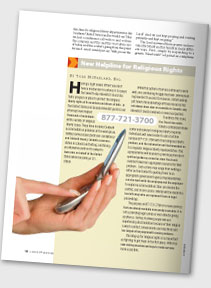877-721-3700: New Helpline for Religious Rights
Todd R. McFarland November/December 2010
Having a right means little if you don't have a mechanism to enforce it. For years the Seventh-day Adventist Church has had a program in place to protect the religious liberty rights of its members and others of faith. In the United States and Canada Adventist pastors and attorneys have helped thousands of individuals with a variety of religious liberty issues. These have included Sabbath accommodation problems in the work place, military service issues (both non-combatancy and Sabbath issues), Sabbath accommodation in schools and testing, and taking an alternative oath not to swear to bear arms on behalf of the United States when becoming a U.S. citizen.
While this system of service continues to work well, one continuing struggle has been communicating how best to access its resources. Unfortunately, just how to take advantage of these resources has not always been clear or accessible to Seventh-day Adventist Church members or even local pastors.
To address this issue, the Church has established a centralized intake center exclusively for religious liberty inquiries. Individuals will now be able to call a toll free number 877-721-3700 with their religious liberty problem, and the information will be forwarded on to a regional religious liberty representative. This representative will be able to provide pastoral and spiritual guidance, as well as steer the church member toward an appropriate recourse for their problem. Such actions may range from writing a letter on their behalf to guiding them to an appropriate government agency. Representatives can also work with the employee and the employer to explore accommodations than can resolve the conflict, and in rare cases a referral will be made to a local attorney who can represent them in legal proceedings.
The purpose of 877-721-3700 is to make services that are already available more easily accessible. It is not a providing legal advice or even directly giving assistance. Rather, it allows people who are experiencing discrimination because of their religion a way to contact someone who can help them and has helped other people with similar problems.
Standing up for religious rights is as important as fighting to get them in the first place. With this new intake procedure we hope to make services more accessible.